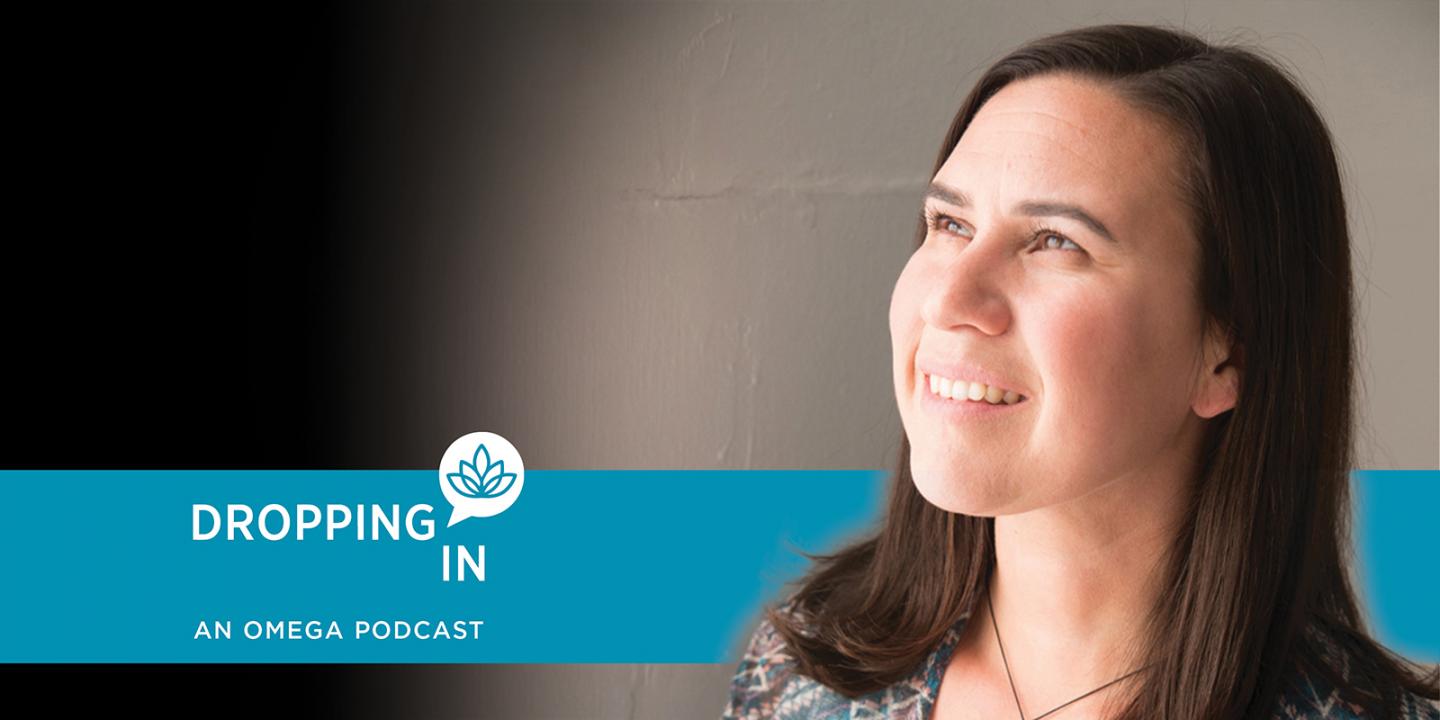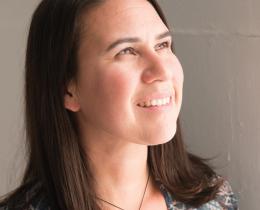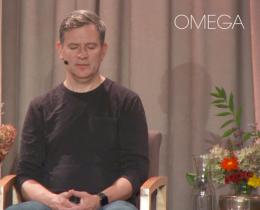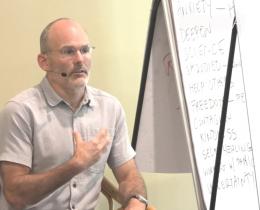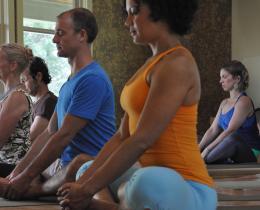Cali Alpert:
Welcome to Dropping In from Omega Institute, a podcast that explores the many ways to awaken the best in the human spirit.
I'm Cali Alpert. Dropping in today, Jennifer Cohen Harper. Jenn is a mindfulness and yoga educator, author, and mother of two daughters who works to help children, teens, and adults develop new ways to manage anxiety. As the founder and CEO of Little Flower Yoga, she brings trauma-informed programming to schools and organizations nationwide. She's the author of the popular Thank You Children series, books for building gratitude, self-compassion, and personal power. And has created a guided online course here at Omega entitled, "Navigating Anxiety in Children" that is available on our website, eomega.org.
Jenn is also the creator of Mindfulness With Horses. Her work has been featured in publications including the New York Times, Yoga Journal, and the Huffington Post. Jenn, welcome. Thank you for dropping in today. So good to see you.
Jennifer Cohen Harper:
Thank you for having me. I'm so happy to be with you, Cali.
Cali Alpert:
So let's start with the word anxiety. The term has become a household term of sorts. And it's an emotion by definition that's categorized by feelings of dread, worry, tension, and an array of physical symptoms. So why has it become so popularized in terms of using this word?
Jennifer Cohen Harper:
Wow, that's a big question. I think anxiety has always been with us, for all of us. Like you said, anxiety is an emotion and it's a normal human emotion that we all feel at different times. And like many aspects of the way that our bodies work to give us information, sometimes it can get a little overloaded, a little over eager. And the prevalence of anxiety in both children and adults has been rising steadily for quite some time.
And the incidence of anxiety disorders in particular, which really is when anxiety tips into having a major impact on day-to-day life, there's more to it. But we can think about that for now.
For kids, many kids, they're being diagnosed at increasing rates with anxiety disorders. And there are many, many reasons for this. I think that anxiety has been increasing for many years. But it's impossible to ignore the impact of the pandemic on anxiety in children.
And as we've made our way through the experience of the Covid pandemic, and the experience that children have had in their schools closing, and the uncertainty that they've faced, and then the experience of reintegrating with the world as the pandemic has ebbed and flowed is something that has really compounded the anxiety response for many people, children and adults alike.
Cali Alpert:
Yeah, I was going to say, is it even separable in terms of how prevalent anxiety has become, coming out of the pandemic between children, teens, and adults? Certainly, the versions and the way they express must be different. I want to talk more about that with you. But in terms of the existence of it, it pretty much touches everybody, doesn't it?
Jennifer Cohen Harper:
Absolutely. It looks different, like you said, it looks different at different ages and stages. And of course, everybody's an individual. And of course, we don't want to ignore the fact either that while this pandemic was unfolding, we were also seeing massive other social and economic changes happening in ways that impact different people differently.
And people were experiencing different levels of anxiety pre-pandemic. So, for some people, the pandemic was an exacerbation of something they were already experiencing. For other people, they're finding new levels of anxiety that they haven't experienced before. But I am seeing a consistent increase across the board, regardless of age. The manifestation is just different.
Cali Alpert:
How has the pandemic inflicted more trauma on children? I know you've talked a lot about the paradox between needing to keep children safe, which means keeping them sometimes often away from other beings, which is exactly the place where they're often meant to commune and learn what bonding is. So as a parent, how do you walk that paradox, that line?
Jennifer Cohen Harper:
Yeah. The pandemic was really interesting in many ways. But for children, I think we're seeing the impact on the flip side. For many children, the actual experience of the pandemic was one of pulling into deeper connection with their primary family, with their caregivers, the people who lived in their home. For some children that actually was a wonderful experience. For other children, depending on the capacity of their caregivers and what was happening in their home at the time, that was an incredibly challenging, sometimes even traumatic, experience.
The impact that is having is that, as children have come back into regular school, and more contact with people outside of their household, they're really all experiencing a sort of mismatch between what our nervous system really wants in order to feel most safe, which is safety in relationship, and what they have been absorbing for years, which is getting too close to other people puts you at risk of getting sick.
So as our kids have been growing through this pandemic experience, it's been really hard for their brains, their bodies, their nervous systems to really relax into comfort around other people, because of all of the habitual pulling back from being close to other people.
And again, some kids had a positive experience of the pandemic, some had a negative experience. But regardless of what that time felt like in the moment, we're all, in some ways navigating the aftermath. Which is that we've been teaching our brain, our nervous system, and our body that closeness with other people is risky.
And yet we know from all of the research, from years of study and interpersonal neurobiology and human development, that the thing that actually gives us the greatest sense of safety and capacity in the world is meaningful, connected relationship. It's a dynamic that's really tricky to navigate. I think many adults are navigating that as well. But of course, our children have gone through this pandemic at a time when their brains were developing. So, the impact is different than it is for adults who had the opportunity to grow up in different times, develop their brain in different times.
Cali Alpert:
It's so interesting, there's so many nuances and so many layers. I mean, obviously it's a very individual thing, anxiety or any emotions that humans experience. Then you put on top of it all the different ways that you just sort of characterized it. And it leads me to believe that it's safe to assume there is no one-size-fits-all in terms of how to deal with it. It's really very unique to each child, isn't it? And to each human, not just children.
Jennifer Cohen Harper:
Yeah, absolutely. And a big part of why I wanted to create this course, and why I'm so passionate about working with folks who are experiencing anxiety—caregivers, and educators, and clinicians who work with children who experience anxiety—is, I think one of the things that makes it so tricky is the idea that we're trying to get rid of it. Because it's just not going anywhere.
And for so many people, the embodied feeling of anxiety is so uncomfortable. And for so many of us, we've grown up with really very little support in understanding the messages of our body, in being comfortable with a wide range of emotions, both kind of where they are in our mind and what they do in our body.
We tend to be kind of a disembodied society. And because anxiety has been rising for so many years, there's been a lot of focus in our world, in our society, in our communities on reducing anxiety or getting rid of anxiety, and people with anxiety absorb that messaging. We can easily start to feel like this anxiety is something I need to get rid of, and that disconnects us from ourselves.
When we live with anxiety, which I do, which many of us do ... Internalizing the idea that I need to get rid of my anxiety is like saying I need to get rid of a part of myself. And that creates shame, it creates disconnection, and it creates a lack of curiosity.
When we want to get rid of something, we don't want to get to know it better. We don't want to become more intimate with it. But my experience has been that actually, getting to know my anxiety better, becoming more intimate with the nuances, really working to sit not in misery, but in an experience that is challenging, working towards getting curious about that experience instead of trying to push it away, has been completely transformative for me and for many, many kids that I've worked with.
And I think that in our current state, where anxiety is so high across the board, it's very easy to get sucked into messaging that says, we need to get rid of this anxiety. And my whole life's work has been about helping children, primarily, integrate all of the different parts of themselves. And know, deeply, that all of those aspects of themselves are lovable and worthy of being not just seen, but being kind of part of the party. Welcome at the table. Not just tolerated, not just reluctantly accepted, but really understanding that all of the different aspects of themselves are there for a reason.
And just like so many things, when we try to push things away, they push back. I think that our sort of cultural drive towards pushing away discomfort has extended to trying to push away anxiety. And predictably, that anxiety is pushing back.
When we can get more familiar with an experience, when we can get curious about it, when we can say, what information is this giving me right now? And then ultimately, what do I want to do with that information? Then we can live with anxiety in a way that allows it to be just part of our experience. Instead of it becoming an overwhelming factor that kind of drags us around by the nose.
Cali Alpert:
It's so important, and so valuable to hear you talk about that piece, the mindfulness around knowing that anxiety, a lot of challenging emotions, is a piece of us and not dictating force. And it's also so common in all kinds of ancient wisdom traditions, and mindfulness trainings and courses and modalities, to befriend all of these parts of us with curiosity and with sort of an innocence and a wondering.
I can't underscore enough how valuable it is to hear you talk about that, and how I know that's such a big part of your teachings. Can you talk about, because you've mentioned this a lot, I think this is also one of the more valuable parts of what you teach, is that the more that parents and caretakers can learn to navigate and manage their feelings and discomforts, the more that naturally rip ripples onto the kids that they're raising or caretaking for. Can you talk a little bit more about that?
Jennifer Cohen Harper:
Yeah, absolutely. And I want to say, I talk about this from the perspective of being an educator, but also from the perspective of being a parent. I have generalized anxiety disorder. I've had many years of experiences with panic attacks. I have two daughters. Having children exponentially increased my anxiety. It was a real moment of learning and growth, and a reset for me when my oldest daughter was born. Anxiety levels that I hadn't experienced in many years really flooded me in a way that I was surprised by.
Now learning more about the experience of becoming a parent, both biologically and socially, I might have seen that coming, if our culture was a little bit more transparent about the experience of both giving birth and parenting. But I didn't see it coming, so my anxiety spiked tremendously. And then of course, being in the line of work that I'm in, I immediately started worrying when my daughter was weeks old that I was giving her anxiety.
Which I know, intellectually, that's not what's happening. And at the same time, I couldn't get this sort of intrusive thought out of my mind. That, get yourself together, Jenn, or you're going to doom your child with the same thing you've suffered from for so long. And that was happening in my mind, even though I didn't actually internally experience myself as suffering from anxiety anymore. Because I had actually gone through this whole experience of befriending my anxiety, and sort of teasing apart what's my anxiety, what's my intuition? What's the piece where I've just been taught to ignore my intuition and assume it's my anxiety, but it's actually my intuition really working for me?
I had done all that work and then I had kids, and it was like... I don't talk about this lightly. I really had to walk through it. And now here I am, 10 years later. My oldest daughter is 10 right now. And I can say I'm still working on it, but what has been clear for many years, in my work life and in my parenting life, is that parents with anxiety, or caregivers with anxiety, actually can be the greatest support for children with anxiety.
And I think we often hear or feel or think the opposite, which is, I have anxiety so the kids around me are going to be anxious and catch it. That's only if we sort of put our head in the sand and pretend anxiety is something to get rid. Of or we ignore it, so we're having one experience on the inside, but acting different on the outside, which kids have very powerful radar for.
When we are incongruent, when we're experiencing anxiety but we're not naming it, we're not navigating it, we're not being curious about it, we're either putting up a wall and pretending it's not there or trying very hard to minimize it and get rid of it, that's when we get into a sticky situation with our kids. Because that's when we're teaching our kids, this feeling is actually a part of you that you want to ignore, or shut away, or work to get rid of. There's something wrong with this experience. And by accident, we can teach our kids that there's something wrong with them.
But if you are an adult living with anxiety, it does not in any way mean that the kids around you are going to catch it, or that they're more prone to anxiety. Now, anxiety does tend to run in families because we have cultures as a family, and because we have shared experiences as a family, and because we tend to, through our actions and behaviors, teach our kids about what's safe in the world and what isn't. Right?
The more that we can get real about our experience, and be transparent with our kids about the things that are hard for us, and transparent about the ways in which we support ourselves and when that works and when it doesn't, the more we actually teach our kids that anxiety is nothing to be ashamed of. It's nothing that you have to feel like there's something wrong with me about, it's just a part of life.
And we all have, in our resources that we can bring to bear in all sorts of challenging situations, we also have external resources like our community. Like our relationship. And I've found that in my parenting life, the more I can tell my kids, "I'm having a hard day today, can you help me out here with da da?" The more I can make it clear to them that just because I'm having a hard time doesn't mean you need to be having a hard time. And my hard time is not because of you. And it's not your responsibility to fix it. And actually, there's nothing that needs fixing. Because it's okay to just be having a hard day.
I talk a lot about this idea of meeting stress within inner strength. That we're not trying to get rid of all our kids' stressors, we're not trying to rainbow and unicorn up the world. Although some days, some days.
And we're not trying to say, anxiety go away. We don't need you right now. You're wrong. We're not really trying to dispute the messages that anxiety is sending. We're actually just trying to become such fully formed, powerful versions of ourselves that that anxiety, I personalize it, but that anxiety doesn't feel as needed. That anxiety, if you can imagine that anxiety as a character or person, it's back there going, I think she's got it. Maybe I don't need to pop up here all the time being like, but what if?
Because it's really not about going down the rabbit hole of the what-if. Anxiety in some ways is about our mind trying to workshop every possible version of a situation so that we feel more safe, so that we feel like we can handle this, this and this. But there's also another narrative, which is just like I believe so much in my capacity to handle things, that it doesn't matter what the thing is.
So I don't have to do the 10,000 mental experiments because it's not really about which way the way the world goes. It's about having enough faith in my capacity, both in my inner resources and my capacity to build strong relationships. And ask for help, and get back up and support. It's both. But I believe that I have the capacity to navigate tricky things, whatever they may be.
Cali Alpert:
And now a word about Omega Teachers Studio. Get ready to be inspired from your very own cushion, Yoga mat, or couch. Omega Teachers Studio brings your favorite teachers direct to you, live and online from their studios, for one-plus hour classes on topics that matter the most.
They're easy to fit in your schedule, and affordable too. Learn more at eomega.org/studio. To receive a 10% discount on any Teachers Studio tuition, enter the code DI10 when registering. That's the letters D and I, and the numbers one and zero.
Now, back to our episode. They say that anxiety, from a spiritual perspective, is really about fear of things that haven't happened yet. And the more we can stay present, the more we can tap into our essence of what it is in the moment, and trust that and surrender into that, the quicker that softens. I'm oversimplifying certainly, but that softens the feelings and those pangs and those onsets of anxiety, right?
Jennifer Cohen Harper:
Yeah, absolutely. So the ability to stay in a place where we ... I don't want to say stay in the present moment, right? Because we all move in and out of the present moment. And there's good reason for that. But to stay aware that we can return to the present moment, even if it's just for a moment, is something that allows us to reset.
And some of the kids that I work with, we work on saying, am I safe right now? For the kids that really do have a lot of fear. Because what can start to happen is, our anxiety about the future sort of steals our capacity to feel safe when we are safe.
I often talk with kids about, there's a protective part of your brain that's really important. We're not trying to make that protective part of your brain less protective. It's there for you in moments where you need to react quickly, or act on instinct.
We all have a protective brain that we are not trying to get rid of. But sometimes that protective brain learns to be overprotective. And when the protective brain becomes an overprotective brain, it often does one of two things. It either teaches kids to push away from relationship, or it prioritizes the power-holders in the room, and their experience, above all else.
So it teaches kids to ignore whatever's happening inside of them so that they can make the power-holder in the room like them, or feel good about them, or have their needs met so that they can have safety. But either way, it's damaging to relationships. Because when we lose our relationship with ourself, then our relationships with other people are not the authentic, healing, security-building, safety reinforcing mechanisms that they can be.
Cali Alpert:
And also that the idea, the self-trust piece never gets formed. To trust your own experience, to know what relationship you're having in a room, or in a situation, or with a person. Because it gets so kind of sideswiped. So yeah, so important.
Jennifer Cohen Harper:
Yeah, so distorted. And the other thing that what you're asking about brings up in my mind when we think about this idea of returning to the present moment, and noticing if we're okay in this present moment, and really actively telling ourselves right now I am okay. That doesn't mean in 10 minutes I will be, but right now I am. Can I feel that? Can I feel that? Can I allow my body to feel okay when I am okay?
It also brings up in my mind the idea of how important it's been for me, and for the kids I work with, to really develop that capacity to witness ourselves. And to know that we are not our thoughts. And again, that's something that transcends many spiritual traditions. And it is such a core part, in my experience, of navigating challenging emotions, living with and befriending our trickier emotions, is the capacity to really know on a deep level, not just know in our mind, but know in our bodies, I'm not my thoughts.
And my mind is a thought making machine. And some of the thoughts it offers up are really helpful. Some are true. Some aren't true. I don't actually have to believe everything I think. Some thoughts are just not very helpful, and some are not very accurate. And it's been amazing to me over the years to see how many kids don't actually know that. Right?
And adults too. They don't allow themselves to be curious about their own inner narrative. I've found over and over again that adults need exactly the same things as kids. Sometimes they just need stronger doses because they've gotten more embedded in the habits that developed in childhood.
I think of it as more like ... Working with kids is so wonderful. Because even though the kids have major challenges and are going through a lot, their defenses are not as embedded. So the opportunity to help them see themselves in the world in a different way, or through a different mindset or lens, they're closer to their essential self. And more likely to act on the outside the way they feel on the inside. And that congruence is such an important part of navigating anxiety, but also just living our full, human life.
Cali Alpert:
The analogy that's coming to mind is that a kid's suitcase is lighter and easier to unpack, right?
Jennifer Cohen Harper:
Yeah.
Cali Alpert:
Yeah. I'd like to just get a brief synopsis. The guided online course that you created with Omega, it's a combination of self-paced modules and live Zoom calls. Which is really cool, because it's such a great community building facet of the course. Who is the course geared toward, and how will they benefit?
Jennifer Cohen Harper:
Well, thank you for asking. So, the course is really created for anyone who lives or works with children who are experiencing anxiety. And that may be the day-to-day emotional experience of anxiety, or children who are actually living with anxiety disorders. The course is appropriate for both.
Caregivers participate in this course a lot, but we've also had many educators and mental healthcare providers join us in the course. Coaches. Almost anyone who works with children right now is seeing the impact of childhood anxiety. Whether helping children navigate anxiety is your focus, or their anxiety is impacting the other work that you're doing together, this course can be really beneficial.
I would say the only people the course is not for is maybe people who just see anxiety in the children around them as something they want to fix, without actually getting real about their own internal experience.
And this is something that we do in the course. It's very focused on supporting our kids, but we also can't support our kids while refusing to have an honest, compassionate look at supporting ourselves. Those things happen in tandem. So that's who the course is for.
And I really love the format of the course, where there is a good amount of self-paced content. There's informational content, there's also lots of actual activities, movement practices, breath work practices, meditations, all sorts of things that you can do with the children in your life, that you can teach your kids to do on their own, that you can do on your own. There's lots of practices in the course.
But then these weekly livestreams are opportunities for us to workshop the material, right? For folks to bring examples of what they're experiencing to the table, to ask questions, for us to support each other on a deeper level.
And one of the things that I've heard over and over from participants is that the sense of community and the capacity to see, even if we know there's lots of kids experiencing anxiety, to actually hear the stories of other caregivers and other professionals who are day-to-day struggling with this, is really affirming. Because we actually feel like we have more capacity in community.
So, the thing that we're trying to build for our kids, where they can kind of find inner resources within the strength of safe, powerful relationships, that happens for us too. Our ability to sit once a week, to support each other in community, really has translated for many participants into an increased inner-knowing that they have what they need to help their children.
Cali Alpert:
Finally, I have three questions I like to ask every guest on Dropping In. These are just short, rapid fire questions. I'd like to grant you one wish for our listeners and our viewers. What would it be?
Jennifer Cohen Harper:
Self-compassion.
Cali Alpert:
And what is something you wish for yourself?
Jennifer Cohen Harper:
Same. And play, and play. I think this year one of my intentions is to remember to play, and to bring more of the spirit of playfulness into my day-to-day life.
Cali Alpert:
And finally, what's the most important offering or tip you'd like our listeners and viewers to take away from our conversation today?
Jennifer Cohen Harper:
I think that at the heart of helping our children navigate anxiety is the deep, deep belief that every child has the capacity to thrive.
Cali Alpert:
Words of wisdom. Jenn, thank you so much for dropping in today. It's been such a pleasure. It's always a pleasure to have these conversations with you. If people would like to learn more about you, about the Omega course that you created and your other endeavors, where can they find you?
Jennifer Cohen Harper:
All the usual places. So they can look jennifercohenharper.com or littlefloweryoga.com. The Jennifer Cohen Harper website tends more towards resources for caregivers. My books, card decks, video resources, things like that. The Little Flower Yoga site tends more towards support for professionals.
The course with Omega, which is really a heart project, one of my favorite courses that I've ever created, you can find eomega.org. If you type in Navigating Anxiety, you can't miss it. Also, it's Jennifer Cohen Harper on Instagram. And then if it folks are interested in the retreat work, the Mindfulness With Horses work, that's a separate website. It's mindfulnesswithhorses.com.
Cali Alpert:
Thank you so much, Jenn. So appreciate it.
Jennifer Cohen Harper:
Thank you, Cali. It's really wonderful to see you.
